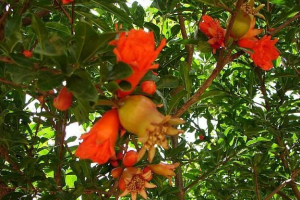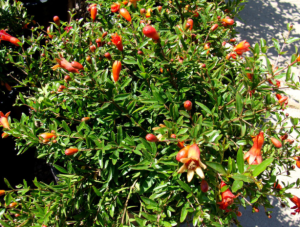BOTANICAL NAME: Punica granatum
FAMILY: Punicaceae
ENGLISH NAME: Pomegranate
COMMON NAME:
Hindi- Anar
Gujarati- Dadam
PLANT IMAGE with Unique Identification Feature:


REFERENCE: BHAVAPRAKASH SAMHITA with link e Nighantu:
https://niimh.nic.in/ebooks/e-Nighantu/bhavaprakashanighantu/?mod=read
दाडिमः करको दन्तबीजो लोहितपुष्पकः |
तत्फलं त्रिविधं स्वादु स्वाद्वम्लं केवलाम्लकम् |
तत्तु स्वादु त्रिदोषघ्नं तृड्दाहज्वरनाशनम् ||८४||
हृत्कण्ठमुखगन्धघ्नं तर्पणं शुक्रलं लघु |
कषायानुरसं ग्राहि स्निग्धं मेधाबलावहम् ||८५||
स्वाद्वम्लं दीपनं रुच्यं किञ्चित्पित्तकरं लघु |
अम्लन्तु पित्तजनकमम्लं वातकफापहम् ||८६||
HABITAT: Punica granatum is native to Iran. It is cultivated throughout India
BOTANICAL DESCRIPTION: It is shrub or small tree, deciduous, glabrous, oftenwith spinescent bracelets.The tree has 2 gender types – one gets only maleflowers and has reddish leaves. The other has both male and female flowers. Leaves are opposite or sub opposite, often fascicledon short petioles. oblong or obovate
Flowers are terminal or axillaries, solitary, large showy, scarlet or orange-red, calyx coriaceous, persistent, prolong above the ovary, free part companulate; ovary inferior. Fruits are large globose, crowned by the somewhattubular limb of the caly. Seeds are angular test a coriaceous. Flowers in April and fruits in June usually.
AYURVEDIC CHARACTERISTICS
| RASA | GUNA | VEERYA | VIPAKA | PRABHAVA | DOSHAGHNTA |
| Khashya
Madhua amla |
Laghu
snigdha |
Ushna | Madhura/amla | Hradhya
grahi |
tridoshshamak |
AYURVEDIC ENERGETICS
| TASTE | PROPERTY | POTENCY | POST DIGESTIVE
EFFECT |
EFFECT
ACTION |
DOSHA
ACTION |
| Astringent,sweet
sour |
Lightness | Hot | Sweet/ sour | Cardiac | Pacifying tridosha |
MAJOR CHEMICAL CONSTITUENTS: The stem bark contain 22-25 % tannin. The root
hark has punicotannic acid. The fruit contains 15% fructose.
Fruit peels – tanni, viz..punicalin. punicalagm etc.
Seed – estrone, punicic acid
Stem – malvidin pentose glucosides. tannin, ursolic acid etc.
THERAPEUTIC USES:
- Haemmoroids– Ghee prepared with Dadimasvarasa andYavakara will check bleeding and pain.
- Gonorrhea– Fruit rind of Dadima is made as infusion and administion with sugar orally.
- Syphilis– Powder of Bankhuka leaves and Dadima bark may be dusted over the scrotum
.
INDICATIONS
Aruchi Anorexia, Arsh Haemmroids, Gulma Tumour, Jwar Pyrexia.
USEFUL PART: Fruit rind, root bark, floralbud, fruit
DOSAGE: Fruit juice– 20-50 ml, decoction 40-80 ml, rind or bark powder 3-5 gm.
AYURVEDIC FORMULATIONS
1. Dadimashtaka
2. Dadimadichurna
3. Dadimadighrita
4. Dadimadyataila
5. Dadimavaleha
